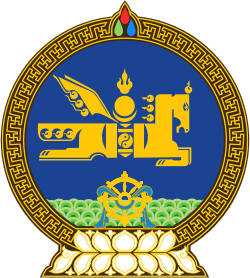Mongolia–Russia relations
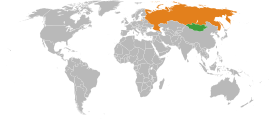 |
|
Mongolia |
Russia |
|---|---|
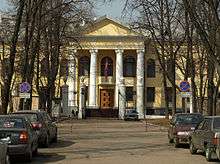
The bilateral relations between Mongolia and the Russian Federation (Mongolian: Монгол Оросын харилцаа; Russian: Российско-монгольские отношения) have been traditionally strong since the Communist era, when the Soviet Union supported Mongolian People's Republic. Mongolia and Russia remain allies in the post-Communist era. Russia has an embassy in Ulaanbaatar and two consulate generals (in Darkhan and Erdenet). Mongolia has an embassy in Moscow, three consulate generals (in Irkutsk, Kyzyl and Ulan Ude), and a branch in Yekaterinburg. Both countries are full members of the Organization for Security and Co-operation in Europe (Russia is a participating state, while Mongolia is a partner).
Background
Russia and Mongolia share a 3,500-kilometer border.[1] Mongol invasions of Russia in the 13th century resulted in the killing of a significant portion of the Russian population and much of modern Russia became tributary to the Golden Horde. When Chinese forces attacked Mongolia in 1919 to negate its independence from China, the Soviet Red Army helped Mongolia ward off the invasion. The Mongolian People's Republic was established in 1921 with Soviet influence.
Communist era
The communist regimes of Mongolia and Soviet Russia forged close bilateral relations and cooperation.[1][2] Both nations established close industrial and trade links, especially with the Soviet republics in Central Asia and Mongolia consistently supported the Soviet Union on international issues.[2] Mongolia sought Russian aid to allay fears of Chinese expansionism and a large number of Soviet forces were permanently deployed in Mongolia.[3] In 1986, both countries signed a treaty of peace, friendship and cooperation.[2] Mongolia sided with the Soviet Union following the Sino-Soviet split in the 1950s. Following the example of Soviet leader Mikhail Gorbachev's policy of improving ties with the West and China, Mongolia improved its relations with the United States and China.[2] In 1989, Mongolia and the Soviet Union finalized plans for the withdrawal of Soviet troops from Mongolia.[2]
Modern era
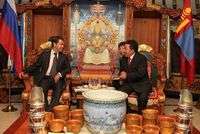
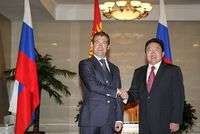
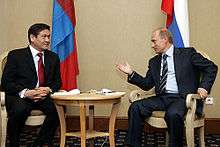
Following the dissolution of the Soviet Union and the end of the Cold War, Mongolia's trade with Russia declined by 80% and China's relations and influence over Mongolia increased.[3] However, Russia has sought to rebuild strong relations with Mongolia in recent years to enhance its standing as a regional power.[3] In 2000, the Russian President Vladimir Putin made a landmark visit to Mongolia — the first by a Russian head of state since Leonid Brezhnev in 1974[4] and one of the first of Putin's presidency — and renewed a major bilateral treaty.[1][3] The visit and improvement in bilateral relations was popularly welcomed in Mongolia as countering China's influence.[3] Russia lowered prices of oil and energy exports to Mongolia and enhanced cross-border trade.[3] The Russian government wrote off 98% of Mongolia's state debt and an agreement was signed to build an oil pipeline from Russia to China through Mongolia.[1]
References
- 1 2 3 4 Blagov, Sergei (May 2005). "Mongolia Drifts Away From Russia Toward China". China Brief. The Jamestown Foundation. 5 (10). Archived from the original on March 22, 2007. Retrieved 2008-06-16.
- 1 2 3 4 5 "Mongolia — Soviet relations". Library of Congress. Retrieved 2008-06-17.
- 1 2 3 4 5 6 "Russia Seeks To Restore Position in Mongolia As Most Favored Neighbor". Eurasianet.org. 2000-11-17. Retrieved 2008-06-17.
- ↑ Montsame News Agency. Mongolia. 2006, Foreign Service Office of Montsame News Agency, ISBN 99929-0-627-8, p. 55
External links
| Wikimedia Commons has media related to Mongolia–Russia relations. |
Diplomatic missions
- (Russian) (English) (Mongolian) Embassy of Russia in Ulan Batar
- (Russian) (English) (Mongolian) Embassy of Mongolia in Moscow
